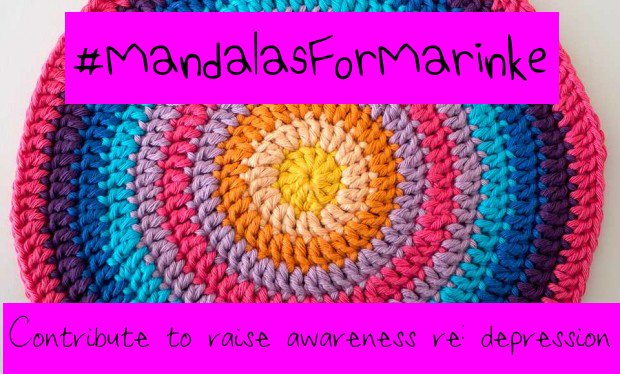Here is the next of the beautiful, inspiring, special contributions coming in to the #MandalasForMarinke remembrance project. I am grateful for each and every amazing contribution. You are invited to join; learn more here.
Beautiful Crochet Mandalas
I’m pretty sure these two crochet mandalas are variations on the spoke mandala crochet pattern by Wink. The smaller one begins with bright, rich colors and blends into softer pinks and corals. The larger one begins with the softer pinks and corals and moves into blues and purples. Together they remind me of a sky at sunrise.
Meet the Maker
The crafter, who has chosen to remain anonymous, writes:
“I’m not sure why but it really upset me to hear about Wink. I didn’t know her or even know of her until now. I read her blog and she just seemed like such a great person. I’ve dealt with my father having depression and my own attempt at suicide when I was only 18. It’s just a terrible, terrible thing.”
Words by Wink
On 2/2/13, Wink shared:
“I had never really thought about my goals & dreams before I started blogging. I was a ‘take it one day at a time’ kind of gal. But I have to say; listing your dreams and goals is very fun, and very helpful! It’s really great to see your goals right in front of you, and know you can achieve most of them, if not all of them!”
About Depression
One purpose of this project is to raise awareness about depression so each post will end with some facts, thoughts or quotes about depression, suicide and/or mental health. One question that many people have is, “is depression genetic?” There does seem to be a link between a family history of depression and suicide and likelihood of those things in an individual.
Elizabeth Landau, writing for CNN:
“A first-degree relative — a parent, sibling or child — of a person who has committed suicide is four to six times more likely to attempt or complete a suicide, said Dr. David Brent, psychiatrist at the University of Pittsburgh Medical Center. Studies on twins have shown that suicidal behavior is between 30 and 50 percent due to heritable factors, he said. Suicide victims’ biological relatives who were adopted away also show an increased risk of suicide, he said.”
Research has shown that we may be able to predict suicide risk in people based on genetics but we are still in the early stages with this. One of my academic texts reports that unipolar depression is probably about 40% genetic and about 60% environmental.
Of course, you having depression doesn’t mean that your child will have depression. It’s just one contributing risk factor that can make the child more vulnerable to depression.
All contributions to Mandalas for Marinke are welcome and will help raise awareness about depression while honoring her work in the same way that this great contribution has done today. Details to join here.






1 comment
Comments are closed.